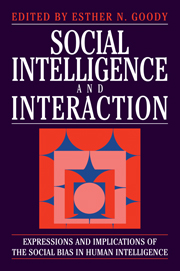 Social Intelligence and Interaction
Social Intelligence and Interaction Book contents
- Frontmatter
- Contents
- List of contributors
- Conventions used in transcripts
- Preface
- Introduction: some implications of a social origin of intelligence
- Part I Primary processes
- 1 The ape legacy: the evolution of Machiavellian intelligence and anticipatory interactive planning
- 2 How to invent a shared lexicon: the emergence of shared form-meaning mappings in interaction
- 3 Hunter-gatherers' kinship organization: implicit roles and rules
- Part II The interactive negotiation of meaning in conversation
- Part III Genres as tools that shape interation
- Part IV Expressions of a social bias in intelligence
- Consolidated bibliography
- Index
2 - How to invent a shared lexicon: the emergence of shared form-meaning mappings in interaction
Published online by Cambridge University Press: 09 January 2010
- Frontmatter
- Contents
- List of contributors
- Conventions used in transcripts
- Preface
- Introduction: some implications of a social origin of intelligence
- Part I Primary processes
- 1 The ape legacy: the evolution of Machiavellian intelligence and anticipatory interactive planning
- 2 How to invent a shared lexicon: the emergence of shared form-meaning mappings in interaction
- 3 Hunter-gatherers' kinship organization: implicit roles and rules
- Part II The interactive negotiation of meaning in conversation
- Part III Genres as tools that shape interation
- Part IV Expressions of a social bias in intelligence
- Consolidated bibliography
- Index
Summary
Recently, we have been exploring a new approach to cognitive anthropology. We've been trying to push the boundaries of a genuinely cognitive unit of analysis out beyond the skin of the individual. Ever since symbolic and cognitive anthropology embarked on their ideational odyssey in the 1950s, they have proceeded without the material and the social. Of course, many people are interested in social cognition where the social world is the content of cognition. And in fact, there are good arguments for believing that human intelligence developed in the context of reasoning about social situations (Byrne and Whiten 1988; Byrne, Chapter 1, this volume; Levinson, Chapter 11, this volume). This kind of relationship between the social and the cognitive is important, but it is still centred on the notion of the individual as the primary unit of cognitive analysis. The social world is taken to be a set of circumstances ‘outside’ the individual about which the individual reasons.
What we intend instead is to put the social and the cognitive on an equal theoretical footing by taking a community of minds as the unit of analysis. This permits us to do three things that are not possible from the traditional perspective. First, we can inquire about the role of social organization in the cognitive architecture of the system and may describe the cognitive consequences of social organization at the level of the community (Hutchins 1991; in press).
- Type
- Chapter
- Information
- Social Intelligence and InteractionExpressions and implications of the social bias in human intelligence, pp. 53 - 67Publisher: Cambridge University PressPrint publication year: 1995
- 28
- Cited by
